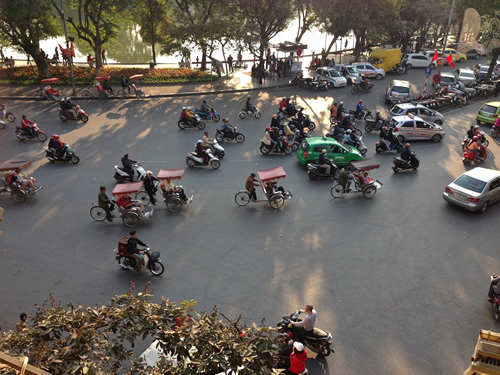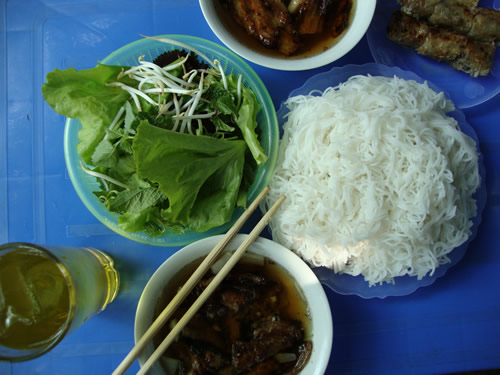Teach English in Hanoi, Vietnam
The Inside Scoop
By Nick Dall
Resources updated 12/5/2023 by Transitions Abroad
 |
| Street traffic in busy Hanoi, Vietnam. |
Our Vision of Vietnam
My wife and I had already been teaching English (in South America and Africa) for a few years when we decided to try to venture out East. Vietnam was very appealing: most schools insisted on CELTA (Certificate in Teaching English to Speakers of Other Languages); the hours were not that bad; and salaries were exceptional. It was almost too good to be true.
We did not know much about Vietnam, apart from the war, but we assumed that it was poor, idyllic, and quite rural. We read a lot about the country and were put off by HCMC: it sounded too big, too frenetic for our liking. Hanoi, according to the guidebooks, was more our scene, an ancient capital slowly coming to terms with modernity.
Applying for Jobs
I was actually applying for Director of Studies or Academic Manager jobs so we decided that I would line something up before we went, but my wife would look for a job upon arrival. We settled on teaching at ILA Vietnam, because the salary was better and because the information about living in Vietnam provided on their website was exceptional. I had three lengthy telephone interviews with various directors of the company, and was then offered the position of Academic Manager in Hanoi.
Two weeks later, we arrived in HCMC for my induction. ILA had taken care of both of our visas, they had met us at the airport, and they had booked us into a hotel at their expense. We also received a decent relocation allowance upon arrival.
Hanoi: First Impressions
After the induction, we flew up to Hanoi. The long drive from the airport started well: we passed through rice paddies dotted with water buffalo. However, once we crossed the massive bridge that straddles the Red River everything changed. The traffic was insane and the city was huge. We had expected to see motorbikes laden with pigs and chickens, but we were not prepared for the sheer volume of traffic. After at least an hour of negotiating the traffic, we arrived at the center of town. Hoan Kiem lake was everything the guidebooks said it would be: tranquil, evocative, and shady. This was more like it.
Hanoi: Working There
My job was hectic, and there was little time to ease into things. I had to work closely with a Vietnamese "Centre Manager" which was a challenge. She was a lot older than I was, and she was used to having her way.
I also had to manage a team of Vietnamese administrative staff: this was far less confrontational, but it had its own challenges. Overall, people would agree to everything I said but never act upon my instructions. This, I would learn, was more typical of the Vietnamese. In the beginning this approach really annoyed me, but I learned to raise issues in conversation and to follow these chats up with an email. I simply re-sent my email if nothing had happened after a week.
My wife also found work at ILA. Most ILA students are kids, and a large chunk of her schedule fell on Saturday and Sunday while she taught her other classes on Tuesday and Thursday evenings. This was a very typical schedule at ILA. She had never taught children before and she found it to be a lot of fun but extremely exhausting. She always had a Vietnamese teaching assistant to help with classroom management, and her relationships with these university students (mainly girls) were sometimes rewarding and sometimes frustrating.
Hanoi: Living There
That first journey from the airport pretty much summed Hanoi up. The center is lovely, but it is packed with tourists. The suburbs are not quite as lovely. ILA’s Hanoi branch was very much on the outskirts of town, in a rapidly expanding middle class suburb. We decided to find a place close to work, and travel to the center of the city in our free time.
We settled into our jobs and living in Hanoi. I rented a motorbike and learned to ride it: this was our transport. Not only was the riding fairly hair-raising, but the pollution we were subjected to on the bike was staggering. I would advise getting a very good air mask and wearing it religiously.
Hanoi is a big city, and there is not very much in the way of nature. We tried to get out of town regularly, and we did take some lovely trips, but leaving the city is not easy, no matter how we did it. Riding our bike meant negotiating road works, bridges, and urban sprawl. Taking a bus meant getting a taxi to the other end of town and then waiting for the bus to leave. Flying somewhere was actually our best bet, even though getting to the airport was a trek.
The good thing about living in Hanoi was the social life. There are thousands of expats living in Hanoi, many of whom are English teachers. It was easy to connect with likeminded people through the excellent website "The New Hanoian" and there really was something for everyone.
 |
| Bun Cha from a street food stall. Photo by Nick Dall. |
We did watch excellent shows (in English) put on by an amateur drama society, and we went to the opera a few times. We attended pub quizzes and saw house films at the lovely Cinematheque.
Other English Teaching Schools in Hanoi
You do not need a CELTA to get a job in Hanoi. There are loads of smaller schools that will employ you just because you are a native speaker. They pay pretty well too, especially because your earnings are "tax free," but they will not offer you any help with visas or work permits.
If want to be legal you need to go with one of the bigger names. In Hanoi, Apollo and Language Link are actually bigger than ILA but all three of these schools offer packages to overseas applicants, and you can even do your CELTA through them. The British Council pays better than anyone else does, but it is also much harder to get a job there: you need two years’ post-CELTA experience as an absolute minimum. A close second to the British Council is ACET.
Teaching at ILA
ILA is a big company, so you do sometimes feel as though you are part of a production line. Managing a school had its own challenges, but as a teacher I would say you are fairly well looked after. Staff room resources are excellent, pay is on a par with other schools, and opportunities for professional development are many. Your teaching will be observed, you will attend workshops, and you will get the opportunity to do the Young Learners extension to the CELTA and — if you are brave enough — the DELTA.
ILA will also get you a work permit, which is a big drawcard. Many of the best teachers worked at ILA for their initial 12-month contract, before moving on to a better-paid school (they do exist if you look around) but still maintained some hours with ILA to keep their work permit up to date.
The Low Down on Vietnam
Vietnam is an excellent country in which to develop your career as an English teacher, and Hanoi is a good place to start. Throughout Vietnam foreign teachers are very well paid and you will have little trouble saving money while at the same time living a life of relative luxury. Opportunities for travel are fantastic as Vietnam is a place of great natural beauty. The food is delicious, and cheap, and the people are friendly.
Nick Dall is a freelance journalist and teacher who was lived and worked in Italy, Argentina, Bolivia, Vietnam and his native South Africa. His interests include languages, fly-fishing, wine and nature. His writing has appeared in numerous publications and his portfolio can be seen on his Nick Dall's website.
|
